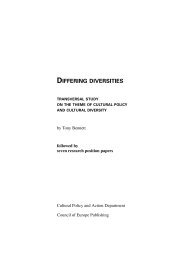Why we need European cultural policies: the impact of EU ...
Why we need European cultural policies: the impact of EU ...
Why we need European cultural policies: the impact of EU ...
Create successful ePaper yourself
Turn your PDF publications into a flip-book with our unique Google optimized e-Paper software.
Prologue When I decided to research <strong>the</strong> role and possible <strong>impact</strong> <strong>of</strong><strong>the</strong> 2004 <strong>European</strong> enlargement on culture, I tested <strong>the</strong> idea with several colleagues. Some triedto dissuade me from pursuing this research claiming, in a friendly manner, but with firm conviction,that <strong>European</strong> Union (<strong>EU</strong>) enlargement had very little to do with culture. This reflects a commonbelief that, simply because culture does not figure prominently in <strong>the</strong> acquis communautaire1– <strong>the</strong> umbrella term which covers all <strong>the</strong> <strong>EU</strong>’s current laws and <strong>policies</strong> – it is only marginallyaffected by <strong>the</strong> <strong>EU</strong> enlargement.In some ways this is true. If <strong>we</strong> think about <strong>the</strong> <strong>impact</strong> <strong>of</strong> <strong>EU</strong> enlargement as meaning solely thosechanges that have resulted from harmonizing legislation which was explicitly related to <strong>the</strong> <strong>cultural</strong>field (such as audio-visual policy), it would be very difficult to justify this research. Ho<strong>we</strong>ver, I havealways understood <strong>EU</strong> enlargement as a process that goes beyond <strong>the</strong> technical adjustment <strong>of</strong><strong>policies</strong> and laws in any policy field. This is just <strong>the</strong> surface.The <strong>European</strong> Union is a complex sphere <strong>of</strong> interlinked rules and interests, <strong>policies</strong>,recommendations and directives. When entering this universe, it is difficult to imagine thatany sector or any segment <strong>of</strong> life can be ignored. Even if <strong>the</strong> <strong>European</strong> Commission has notbeen directly regulating some fields, societies have been going through pr<strong>of</strong>ound changes andeveryone who lives and works in that environment is being affected. This is particularly evidentin <strong>the</strong> transition countries – a term which broadly covers <strong>the</strong> post-socialist nations – which havebeen going through many changes and reforms.In my research I have tried to look at this sphere and to identify some <strong>of</strong> those <strong>policies</strong>,developments or events that have had an <strong>impact</strong> on culture. While trying to assess <strong>the</strong> currentsituation and developments, I have tried to look at possible future scenarios for <strong>EU</strong> involvement in<strong>the</strong> field <strong>of</strong> culture. One <strong>of</strong> my main assumptions was that in <strong>the</strong> future, <strong>the</strong> regulation <strong>of</strong> <strong>cultural</strong>markets will be one <strong>of</strong> <strong>the</strong> key, if not <strong>the</strong> most important, element <strong>of</strong> <strong>cultural</strong> <strong>policies</strong>. I wanted t<strong>of</strong>ind out how Europe has been responding to trends <strong>of</strong> commodification in all aspects <strong>of</strong> culturein order to see if <strong>the</strong> <strong>EU</strong>’s <strong>of</strong>ten publicly declared priority <strong>of</strong> promoting <strong>cultural</strong> diversity and `unityin diversity’ was really accompanied by <strong>the</strong> most effective policy instruments. Has Europe found away to integrate adequately both <strong>cultural</strong> and economic aspects <strong>of</strong> <strong>cultural</strong> goods and services inits <strong>policies</strong>?In that context, <strong>the</strong> study tried to identify those `o<strong>the</strong>r’ common, (in o<strong>the</strong>r words, shared) <strong>EU</strong><strong>policies</strong> that affect <strong>cultural</strong> <strong>policies</strong> as <strong>we</strong>ll as to assess such influences – can <strong>the</strong>y be consideredas positive or negative? How have new <strong>EU</strong> member states been responding to change? Are <strong>the</strong>resome <strong>policies</strong> that should be adopted at <strong>the</strong> <strong>EU</strong> level in order to counterbalance <strong>the</strong> <strong>impact</strong> <strong>of</strong>cross-cutting measures, such as taxation, for instance, on <strong>cultural</strong> <strong>policies</strong>?I have been much encouraged by <strong>the</strong> global movements for <strong>the</strong> protection <strong>of</strong> <strong>cultural</strong> diversity and<strong>the</strong> role <strong>of</strong> <strong>the</strong> <strong>EU</strong> during <strong>the</strong> negotiations in 2005 on <strong>the</strong> UNESCO Convention on <strong>the</strong> protection8Prologue














